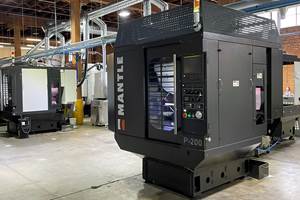Shops Differ on Cellphone Policies
Is the distraction of cellphone and device use on the shop floor a problem in your facility? What restrictions should govern cellphone use in the shop? Various shop owners and managers commented on this question in ¸ßĹâÂĘÁůşĎ˛Ę’s LinkedIn group.
Share





Can you remember a time when the only telephone in the production area was a landline shared by the shop employees? Today, practically any production employee is likely to have a sophisticated communication and media device in his or her pocket.
On ¸ßĹâÂĘÁůşĎ˛Ę’s “Top Shops” network on LinkedIn, I began a conversation by asking shop owners and managers about their shops’ policies regarding employee cellphone use on the shop floor. Should employees be free to use their data devices, or should there be restrictions?
Here is some of what the participants in the LinkedIn discussion had to say….
Michael Sheridan, owner, : “We allow the limited use of cell phones during work hours, meaning calls of a minute or two a couple of times per day. We do not permit texting or game playing, and no earphones are permitted. Because the employees are adults who consider these rules common sense, no one takes advantage of them.”
Amy Petersen, owner (now retired), : “At our plant, cell phones are kept in the employee lockers. Employees are free to check for calls, emails and texts during breaks and lunch period. In case of emergencies, they instruct family members to call the main office so they can be paged. Works great for us!”
John Baklund, owner, Baklund R&D: “We allow employees’ phones to be on, but we have a policy of only calling, texting or emailing members of our BRD team. This allows for quick and efficient workflow. Everyone appreciates this—they can still see texts from friends or family. We discuss the distraction factor often, so as to teach people how to structure their response to this new technology appropriately. We have young people who only have a cell phone, no land line. Some have thanked us for talking about this; it has helped them in life outside of work.”
A manufacturing engineer (I was unable to get his permission for a direct quote) commented that there had certainly been cell phone problems at his plant, but noted also that cell phones are handy. Shopfloor personnel can text him when they need him, saving them from time-wasting trips to the office area.
A job shop owner (ditto) said he had a flat rule about no cell phones in the shop. Employees leave them in their lockers and can use them on break. The lead carries a wireless handset for the main line in case of emergency.
Adam Govoni, machine shop supervisor, Vander-Bend Manufacturing: “It is clear that there are many policies regarding cell phones. Shop cultures will vary. The key is a balance between safety and productivity with a view toward employee satisfaction. I think we have the most productive crew in our region in part because of an attitude of mutual respect throughout the team.”
Mark Kenworthy, owner, Kenworthy Machine: “If you have an employee who will abuse having a cell phone at work, to the extent that the employee isn't working productively, then the issue isn't the cell phone policy. The issue is that employee's attitude. Either the attitude needs to change or that employee needs to be encouraged to find employment elsewhere. Otherwise, that person’s behavior will negatively affect the attitude and productivity of the rest of your team.”
One of the shop owners who got me interested in this question in the first place was Matt Guse of MRS Machining. He ultimately decided to implement a shop-wide cell phone ban. Read about how that went.
Related Content
Workholding Fixtures Save Over 4,500 Hours of Labor Annually
All World Machinery Supply designs each fixture to minimize the number of operations, resulting in reduced handling and idle spindle time.
Read MoreDN Solutions Responds to Labor Shortages, Reshoring, the Automotive Industry and More
At its first in-person DIMF since 2019, DN Solutions showcased a range of new technologies, from automation to machine tools to software. President WJ Kim explains how these products are responses to changes within the company and the manufacturing industry as a whole.
Read MoreIn Moldmaking, Mantle Process Addresses Lead Time and Talent Pool
A new process delivered through what looks like a standard machining center promises to streamline machining of injection mold cores and cavities and even answer the declining availability of toolmakers.
Read MoreInside Machineosaurus: Unique Job Shop with Dinosaur-Named CNC Machines, Four-Day Workweek & High-Precision Machining
Take a tour of Machineosaurus, a Massachusetts machine shop where every CNC machine is named after a dinosaur!
Read MoreRead Next
AMRs Are Moving Into Manufacturing: 4 Considerations for Implementation
AMRs can provide a flexible, easy-to-use automation platform so long as manufacturers choose a suitable task and prepare their facilities.
Read MoreMachine Shop MBA
Making Chips and ¸ßĹâÂĘÁůşĎ˛Ę are teaming up for a new podcast series called Machine Shop MBA—designed to help manufacturers measure their success against the industry’s best. Through the lens of the Top Shops benchmarking program, the series explores the KPIs that set high-performing shops apart, from machine utilization and first-pass yield to employee engagement and revenue per employee.
Read More





















